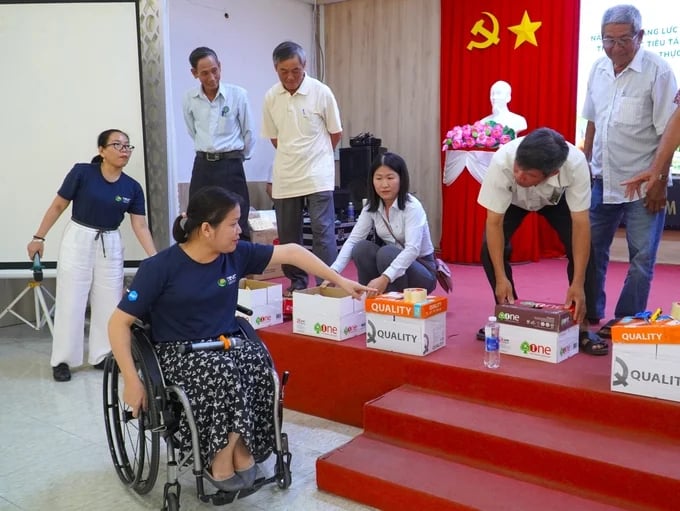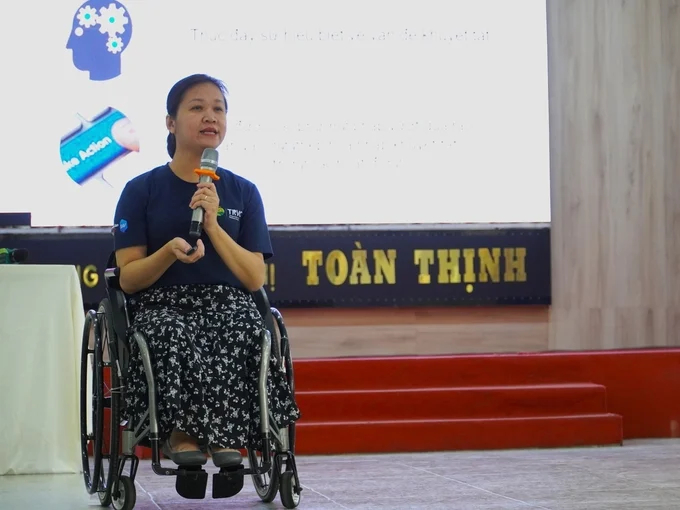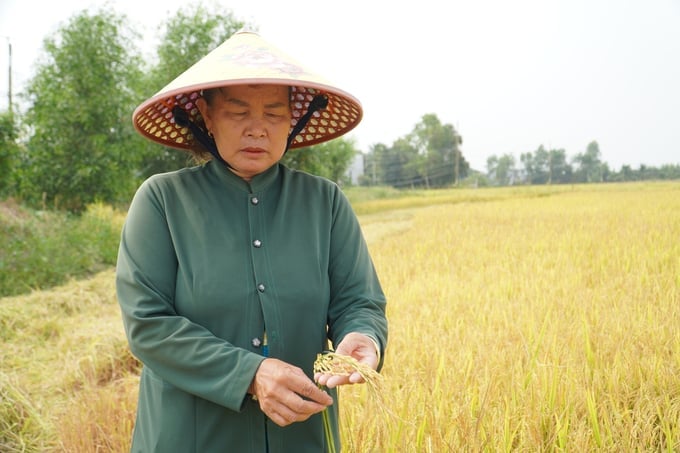May 30, 2025 | 13:55 GMT +7
May 30, 2025 | 13:55 GMT +7
Hotline: 0913.378.918
May 30, 2025 | 13:55 GMT +7
Hotline: 0913.378.918

Practice activities and learn about gender equality and social justice at the training program. Photo: Kim Anh.
From August 7 to 9, the Department of Crop Production (Ministry of Agriculture and Rural Development) coordinated with the Dutch Development Organization SNV to organize training "Improving the capacity to practice gender equality and social justice for 7 locations implementing the model of the 1 million hectares of high-quality, low-emission rice project", including 3 localities: Soc Trang and Tra Vinh and Can Tho City.
In Soc Trang, some farmers asked: Why are gender equality and social justice mentioned and become one of the factors ensuring the criteria of the 1 million hectares of high quality rice project?
This is also an important content that the program wants to clarify. From there, improve practical capacity so that farmers, cooperatives and local agricultural sectors have solutions to promote integration during the implementation of the 1 million hectares of high-quality rice project.
Master Nguyen Thi Lan Anh, consultant on disability inclusion, said that Vietnam is aiming to build a sustainable and competitive agriculture. In this economic transformation, women and many different disability groups will be more or less affected.
Typically, women are limited in their land ownership rights to access credit and ensure their livelihoods. Or women and disabled groups often participate in labor activities, which have lower value in the agricultural value chain.

Master Nguyen Thi Lan Anh, consultant on disability integration, clarifies issues of disability integration. Photo: Kim Anh.
Particularly for the Mekong Delta region in general and Soc Trang province in particular, women are now involved in household decisions about purchasing input materials or setting selling prices for products.
However, the control and decision-making power of the above subjects will decrease as agricultural enterprises develop.
Therefore, women often do not participate in large production investments and have limited access to other resources to take advantage of business development opportunities in agricultural fields.
To integrate gender equality and social justice issues into some contents of the 1 million hectares of high-quality rice project, Ms. Lan Anh said that it is necessary to complete the technical packages, ensure sustainable development criteria, including disability integration when transferring to farmer households and cooperatives.
Demonstration and training models for farmer households and cooperatives must ensure the participation of people with disabilities. Reorganizing production, training, capacity building, and signing association contracts should give priority to cooperatives and production households with disabilities.

Women's control and decision-making power in agriculture will decrease as agricultural businesses develop. Photo: Kim Anh.
In addition, investment components to upgrade infrastructure in specialized farming areas need to ensure accessibility for people with disabilities. For example, investing in synchronous mechanization takes into account the reduction of heavy labor for people with disabilities or those with reduced working ability.
Another issue mentioned in the 1 million hectares of high quality rice project is market requirements on social responsibility. Thus, one of the factors to ensure this requirement is disability integration. Through support and good implementation of policies to ensure welfare for farmers, cooperatives participate in projects on health, culture, education and vocational training.
In addition, enhance the role of women and disadvantaged groups, including people with disabilities. Typically, in rice production, it is necessary to consider gender, people with disabilities, the elderly, and vulnerable people in society, with their needs and capacity to participate.
This will create conditions for the above subjects to integrate into the community, develop their own abilities for the development of the community and family, and equally benefit from the results of that development.
Translated by Phuong Linh

(VAN) Ms. Nguyen Thi Dung, Deputy Director of Ngoc Hoang Cooperative, shared about the journey of bringing dragon fruit to Europe, achieving annual revenues in the billions of VND.

(VAN) Bamboo products from Thang Tho Bamboo Cooperative have reached many countries around the world, while also creating jobs for local workers.

(VAN) The Management Board of Con Dao National Park reported that a green sea turtle, tagged in the Philippines, has traveled thousands of kilometers to lay 84 eggs on Bay Canh Islet.

(VAN) Green technology is paving a new path for sustainable aquaculture in the Mekong Delta in particular and across the country in general, helping reduce emissions and adapt to climate change.

(VAN) On May 27, La French Tech Vietnam (the French startup and innovation community in Vietnam) held the French Tech Summit Vietnam 2025.
/2025/05/27/4731-2-223159_980.jpg)
(VAN) No votive paper, no styrofoam, no plastic bags, no plastic bottles, and no single-use plastic trays are the key rules tourists should keep in mind when visiting Con Dao.

(VAN) In the fight against plastic pollution, Vietnam has been demonstrating a proactive, pioneering, and active role in addressing the greatest environmental challenge today.